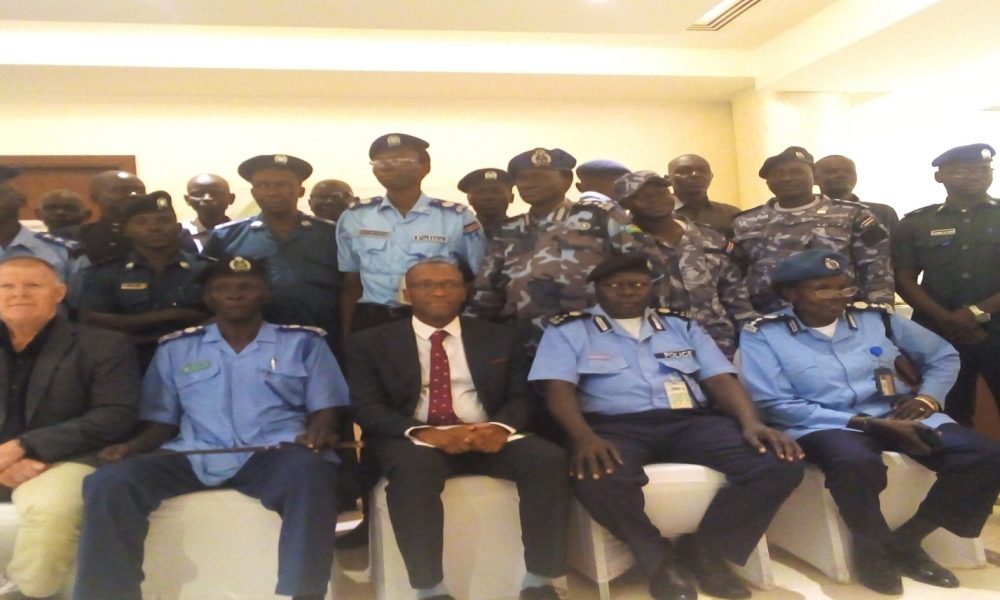By Emelda Siama John Lopula
The reconstituted Joint Monitoring and Evaluation Commission (JRMEC) and South Sudan National Police Services (SSNPS) agree to curb gender-based violence in the country.
The resolution for the police force to uplift the fight against gender-based violence was reached during a one-day training workshop organized by JRMEC at the Imperial Hotel, on Wednesday in Juba City.
Over 50 officers from the South Sudan national police service attended the training which aimed at internal information co-ordination and reporting system to enhance effective sexual Gender Based Violence awareness, prevention and investigation of cases.
R-JMEC and the Police Services human resources development are to collaborate to build information-sharing platforms to improve law enforcement emergencies and other stakeholders to utilize reporting in pro-active decision-making.
South Sudan police force Human Development officer, Lt. Gen. Jackson Elias observed that the biggest challenge of sexual gender-based violence (GBV) in South Sudan is that survivors do not report cases to the authorities, due to social stigma and fears.
“South Sudan National Police Services (SSNPS) is to protect crimes, and these cannot be active unless there is a good communication system as well as awareness to the communities and their legal rights,” Elias said.
Jackson stated that the planning with JRMEC is very significant to the law enforcement agencies in order to explore a means to develop a strategy on how to create awareness to empower the communities to report GBV cases to the concerned authorities.
“There is a need to also empower the communities to be aware of critical measures of Gender Based Violence, especially the vulnerable groups,” he said.
Meanwhile, Deputy Chief of Staff of Reconstituted Joint Monitoring and Evaluation Commission (JRMEC), Thomson Fontaine said that there were provisions that refer to the prevention of all forms of violence against women and girls, including measures to prevent gender-based violence in general.
“JRMEC supports all efforts of the implantation and normalization of provision and the norms they represent,” Fontaine said.
He noted that the development and implementation of special protection units by the National police services with core objectives to prevent and investigate, gender and child-based offenses are recognizable steps to ensure the safety and protection of all citizens.
According to Fontaine, despite the significant effort undertaken by the South Sudan government and the international community, the pace of reforms in the security sector especially, police reform with a particular focus on sexual gender-based violence convictions is moderately low.
He attributed the low rate of convictions on GBV cases to weak institutional capacity, poor inter-agency coordination, fragmentation of effort and interests, as well as financial constraints.
“The meaningful participation of women and girls in ongoing security sector reform in general and in the reform of South Sudan national police services in particular, as envisioned in chapter 2 of R-ARCSS as an avenue to end SGBV and gender inequality leaves a great deal to be desired,” he added.
Deputy police spokesperson, who also couples as the Director of Special Protection Unity (SPU), James Dak Karlo suggests that to enhance curbing SGBV, the perpetrators need to be handed over to face the law.
He added that GBV survivors should be encouraged to report on cases and be protected as well given trauma and stigma healing.
According to the Director of Special Protection Unity, armed forces rank top as perpetrators of gender-based violence in the country.
“Before the crisis, we were accused to be the first perpetrators, SSPDF, Southern Sudan National police service, the second and the third perpetrator is SPLM-IO of Riek Machar and followed by Low Position Army in regard to the Cases of GBV” the police spokesperson noted.




